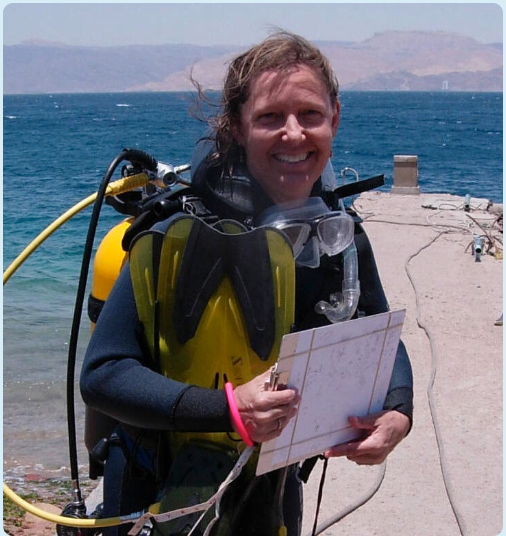Contributed by Taylor Kraabel, Office of Sustainability Intern
Dr. Nanette Chadwick wears many hats at Auburn University. As the Director of Academic Sustainability Programs (ASP), she has been an integral part of Auburn sustainability for the past eight years. In addition to this role, Chadwick has also spent 30 years conducting research in marine biology and ecology. Due to her experience and expertise in this field, she also teaches several classes, both undergraduate and graduate, on these topics.
Getting Involved with Academic Sustainability Programs
Chadwick says ASP can be broken down into three main areas: curriculum, research, and coordination with other campus units. The first main area, curriculum, includes faculty development and enhancement of sustainability content in courses throughout the university and supervising the Minor in Sustainability Studies. Every other year, Chadwick leads a training program for faculty who wish to incorporate sustainability topics into their classes. At the end of the training, participants may earn a monetary award by successfully aligning their course material to sustainability. Another area or ASP work includes sustainability research. Chadwick conducts an inventory of all the sustainability research currently happening at Auburn to encourage collaboration between faculty and departments. On top of all of this, Chadwick coordinates with other sustainability-related programs, student groups, and facilities around campus to help strength sustainability in Auburn’s academic offerings.

Dr. Nanette Chadwick studying coral reefs
Even before becoming the Director of ASP, the presence of sustainability in Chadwick’s life was evident. Her primary professional experience with sustainability consists of her coral reef research. For the past 30 years, Chadwick has been at the forefront of coral reef research and conservation. She has worked with the Catalina Island Marine Institute to expose younger generations to the oceanic environment and help them foster a love for this unique habitat. She has also been involved with The School for Field Studies in the Caribbean and the Arava Institute for Environmental Studies in Israel where she has taught students about conservation issues, and the Interuniversity Institute for Marine Research where she has conducted much of her research. This passion for the environment opened the door for Chadwick to be exposed to the other topics and complexities of sustainability.
The future of ASP at Auburn is bright as Chadwick is always thinking of new ways to expand the program. Due to the popularity of the Introduction to Sustainability course, Chadwick has recently hired a full-time sustainability instructor. She anticipates that a second instructor may be needed in the near future as well, given sustainability is becoming increasingly prominent in today’s society and among Auburn students. As of now, several majors offered at Auburn actually require Introduction to Sustainability as part of their curriculum, a step Chadwick hopes other colleges will also take. The presence of sustainability in Auburn academics and its expansion directly reflect the efforts of Chadwick and ASP.
Sustainability Challenges and Inspiring Initiatives
While there are countless sustainability challenges, two stand out in Chadwick’s mind – climate change and human population growth. Perhaps the most pressing issue is climate change, which is Chadwick’s main concern in part because it is causing a major decline of coral reefs. Chadwick says that one of the reasons more is not being done to combat climate change is the long lag time between our emissions and their effects. It is often difficult for people to see that link, thus posing the question: “Can we respond to this crisis in time?”
Another sustainability obstacle is the growing human population. Under current conditions, Chadwick states that the natural world simply cannot support the number of humans that are projected to be inhabiting it. She says the best way to combat this issue is providing education and career opportunities for women. Studies have discovered that the number of children women have is linked to their education level and/or occupation, with more educated women choosing to have fewer children. Fortunately, progressive global movements have encouraged this shift, a promising sign that this issue is resolvable.
In and around Auburn, much is being done to make our community and campus more sustainable; however, the dining program is Chadwick’s personal favorite. Tiger Dining uses a great deal of local food, with a goal to have at least 20% of it coming from our region. They are also involved in reducing food waste by collaborating with the Campus Kitchens Project, which donates leftover food to those in need. Tiger Dining has also banned the use of styrofoam within campus dining operations, opting for recyclable and compostable options instead. Chadwick says that fostering programs such as these is what puts Auburn at the forefront of sustainability in higher education.





Thank you for sharing this story. Nanette was and will continue to be an inspiration and our conscience in choices we make concerning sustainability.
Thanks for the email and for sharing this story. I personally did not know Dr. Chadwick but regret that I didn’t. She was a remarkable human being and based on this article she contributed a lot to Auburn University’s Sustainability Department. Because we are family at Auburn, she will be missed but never forgotten.